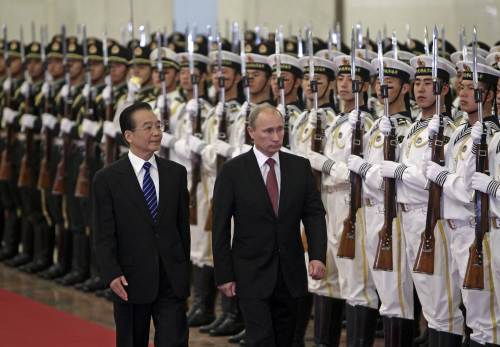BEIJING (AP) -- Russian Prime Minister Vladimir Putin and Chinese leaders opened two days of meetings Tuesday aimed at boosting relations amid strains over declining military sales and stalled talks over energy deals.
Putin said after meeting with Premier Wen Jiabao that political relations between the countries were good, but hinted that tough negotiations over a massive natural gas deal still had a distance to go.
``Those who sell always want to sell at a higher price, while those who buy want to buy at a lower price. We need to reach a compromise which will satisfy both sides,'' Putin told reporters. He is to meet President Hu Jintao on Wednesday.
Besides a struggle to increase trade and agree on sales of Russian gas to fuel China's booming economy, Moscow is also unhappy with China's copying of Russian fighter jets and other military hardware and recently announced the arrest of a Chinese man accused of seeking to buy military secrets.
Putin's two-day visit follows his recent announcement that he plans to swap jobs next year with President Dmitry Medvedev, returning him to the top position he held for eight years. Many observers say that transition could see Russia turn eastward after years of warming ties with the West under Medvedev.
 |
Russia’s Prime Minister Vladimir Putin (right) and China’s Premier Wen Jiabao inspect an honor guard during a ceremony at the Great Hall of the People in Beijing on Tuesday. (AFP-Yonhap News) |
One area of cooperation in which China and Russia appear closer is international policy. Last week, both vetoed a U.N. Security Council resolution condemning Syria for its brutal crackdown on pro-reform protesters that has killed nearly 3,000 people since March.
The vetoes drew heavy criticism from U.S. Secretary of State Hillary Rodham Clinton.
Russia and China are also seen as key to how the Group of 20 responds to renewed fears the global economy is headed toward a new recession.
Bilaterally, the two have worked to overcome mutual distrust from the Cold War and have increased two-way trade volume to $35.9 billion in the first half of the year, up 39.6 percent from the same period last year, according to official Chinese figures.
Efforts to finalize the natural gas deal have stalled mainly because of pricing disagreements. Russia is eager to link gas prices to oil prices as it does in Europe, but China says that is too expensive.
Wen told reporters China wanted to push ahead a ``comprehensive strategic partnership'' with Russia that would safeguard world stability and development.
Russian and Chinese officials say deals worth $7 billion are to be signed during the visit in fields ranging from mining to biotechnology and space exploration.
The sides are looking for even more cross-border investment, and on the eve of Putin's visit, Chinese Vice Premier Wang Qishan called for more financial cooperation and accelerated construction of cross-border highways, railways, bridges, power grids, telecommunications links, and oil and gas pipelines.
But hanging over the visit is last week's announcement in Moscow that Russia's intelligence service had detained an alleged Chinese spy who tried to obtain designs of an advanced missile system as part of Beijing's efforts to update its weaponry.
The Chinese national, who worked as an interpreter for visiting Chinese officials, attempted to buy documentation for the S-300 long-range surface-to-air missile system, the Federal Security Service said. He faces up to 20 years in jail if convicted.
The truck-mounted S-300 is capable of shooting down aircraft, cruise missiles and ballistic missile warheads at ranges of more than 90 miles (144 kilometers) and at altitudes of about 90,000 feet (27,432 meters).
In recent years, Russia banned the sale of the S-300 systems to Iran and Syria following international pressure. China has bought an export version of the system considered less capable than that used by Russia's armed forces.
Friction has also arisen from China's copying of Russian military hardware, especially the Su-27 jet fighter and its aircraft carrier variant, the Su-33.
Such copying has contributed to a virtual collapse in Chinese arms sales from Russia, further exacerbating the trade imbalance between the sides and fueling a growing competition for export markets among developing nations.




![[Herald Interview] 'Trump will use tariffs as first line of defense for American manufacturing'](http://res.heraldm.com/phpwas/restmb_idxmake.php?idx=644&simg=/content/image/2024/11/26/20241126050017_0.jpg)

![[Health and care] Getting cancer young: Why cancer isn’t just an older person’s battle](http://res.heraldm.com/phpwas/restmb_idxmake.php?idx=644&simg=/content/image/2024/11/26/20241126050043_0.jpg)

